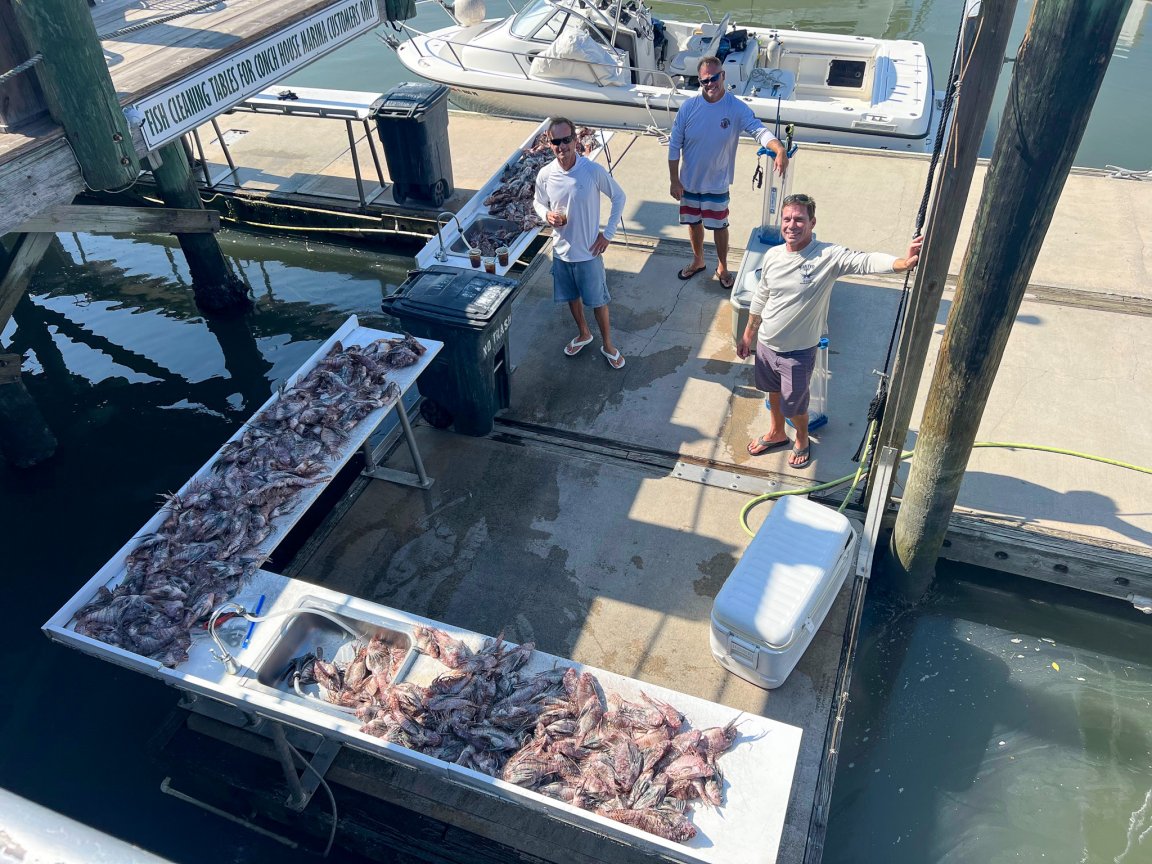The FWC Lionfish Challenge in Florida saw record-breaking participation and harvest numbers this year. Some 285 divers removed 31,773 invasive lionfish from fragile coral reef ecosystems in the Gulf of Mexico and the Atlantic Ocean, according to a press release from the Florida Fish and Wildlife Conservation Commission.
One of those scuba divers was 46-year-old Baye Beauford of Jacksonville, who harvested 915 lionfish on his own with a pole spear. Beauford went on to win the recreational division of the competition, which stretched over four months. He won the same division in 2023. Beauford’s friend and dive partner, Dale Wolber, came in second place with 866 fish, and Tim Robinson of Broward County (who OL has spearfished with before) came in third with 726 lionfish.
“The first year of the challenge, I got second place and I didn’t even try,” Beauford tells OL.

Beauford’s not bragging. Instead, he chalks up the ease with which he beats other divers to the alarming severity of the lionfish problem off the coast of Duval County in northeastern Florida. Divers in the Jacksonville area exert very little pressure on the lionfish population. This sets Jacksonville apart from other areas of Florida, like the Keys, where divers harvest lionfish more regularly and keep the populations lower. Over the four months of the competition, Beauford and his friends went on roughly one or two trips a week, which means his 915 lionfish came from just a few dozen excursions.
The divers travel about 30 miles offshore to get to reefs with the most explosive lionfish populations. They dive to roughly 90 to 100 feet and hunt for a half-hour or so at a time, Beauford says. Lionfish are relatively easy to spot around these reefs, even though they aren’t large fish; Beauford’s personal record is a 2.98-pounder.

Recreational participants like Beauford report fish to the months-long competition by cutting off lionfish tails, freezing them, and delivering them to a nearby check station, usually a bait shop or other certified location.
Florida’s Lionfish Problem
Lionfish are ravenous, invasive, predatory fish that have taken up residence in the waters around the Gulf of Mexico and the Atlantic Coast, feeding on grouper, snapper, and other gamefish species in the area. They are native to Indo-Pacific waters, but likely ended up near Florida and elsewhere along the U.S. coast as a result of the aquarium trade.
Because native predatory fish in the area don’t recognize lionfish as potential prey, they have no natural predators at the moment. This is where spear divers come in. Similar to Florida’s Python Challenge, the Lionfish Challenge incentivizes divers to harvest as many lionfish as possible, in hopes of making a difference in the preservation of native marine ecosystems.
A single lionfish living in a coral reef can reduce the recruitment, or the successful population growth, of native reef fish by up to 79 percent, according to NOAA. Considering the fact that lionfish can achieve population densities of 200 fish per acre of reef, they take a massive toll on native fish numbers.
It helps that lionfish also happen to be delicious, and that their skin is useful for intricate jewelry and leather detailing. Both these uses help create a demand for lionfish byproducts, which in turn helps incentivize removal. In fact, the commercial division of the Lionfish Challenge is reserved for divers who sell the fish they harvest, and their harvests are recorded by pounds rather than individual fish. (All top three commercial finishers were also from Duval County — divers Beauford knows well; Matt Meyers came in first place with 1,785 pounds of fish.)

Currently, a pound of lionfish meat fetches around $6, Beauford says. Lionfish has become his family’s favorite protein; Beauford says it’s similar to hogfish or red snapper with its white, flaky flesh. Now, he just wants to see more people get on board.
“People don’t hear about them because they’re not on the menu in a lot of places,” Beauford says. “We have one distributor here that owns nine restaurants, and he showcases them on his menu. But that’s pretty much it up here [in Jacksonville].”
If other culinary favorites like grouper and snapper are getting decimated by lionfish, then Beauford sees an opportunity to help re-regulate the marine food chain by changing what fish he puts on his table.
“Lionfish can eat three times their bodyweight in one day, and they’re eating grouper and snapper and all of the species that are heavily regulated that we would otherwise be eating,” he says. “But this species is actually a sustainable source of fish. We can’t get them all, and they multiply so fast.”
Read Next: Photos from the World’s Biggest Lionfish Derby
Although Beauford plans to continue spearing lionfish outside the competition, he still got a kick out of being crowned the Lionfish King for the second year in a row.
“It feels great,” Beauford says of winning this year’s competition. “We all know each other. We’re a team that goes out and kills it.”
